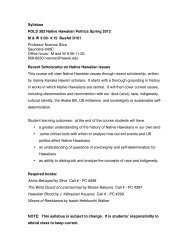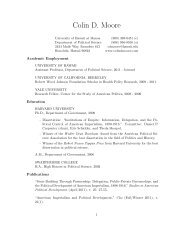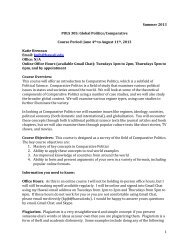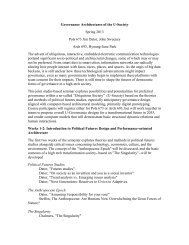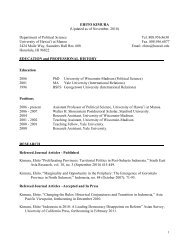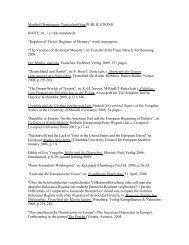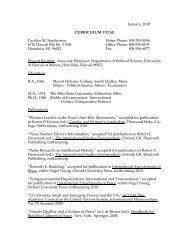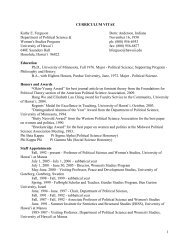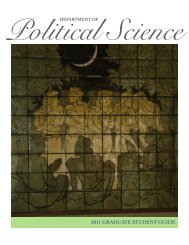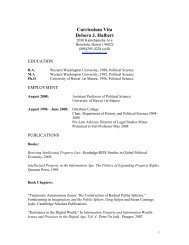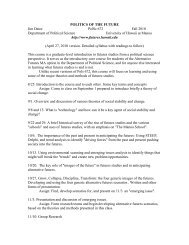syllabus - Department of Political Science
syllabus - Department of Political Science
syllabus - Department of Political Science
Create successful ePaper yourself
Turn your PDF publications into a flip-book with our unique Google optimized e-Paper software.
Introduction to Indigenous Politics<br />
<strong>Political</strong> <strong>Science</strong> 304 – MWF 11:30 – 12:20<br />
Saunders 541<br />
Pr<strong>of</strong>essor: Dr. Hokulani K. Aikau<br />
E-mail: aikau@hawaii.edu (this is the best way to contact me as I check email several times a day.)<br />
Office Hours: Monday 1:30 – 3:30; by appointment<br />
Office: 611 Saunders Hall<br />
Office Phone: 956-8171<br />
Course Overview<br />
As Alfred and Corntassel assert, to be Indigenous today entails living an “oppositional, place-based existence, along with the<br />
consciousness <strong>of</strong> being in struggle against the dispossessing and demeaning fact <strong>of</strong> colonization by foreign peoples” (Alfred &<br />
Corntassel 2005, 297). According to the United Nations Permanent Forum on Indigenous Issues, there are over 370 million indigenous<br />
people in over 70 different countries. We will not be able to fully survey this diversity, but you will get a sense <strong>of</strong> the breadth and<br />
dynamism <strong>of</strong> the issues and movements that constitute this political field. Through this course, participants will develop our collective<br />
and individual understandings <strong>of</strong> Indigenous peoples’ struggle against colonialism and globalization and the alternative futures leaders<br />
envision for their people.<br />
This course is interdisciplinary in so far as the global Indigenous peoples’ movement encompasses Indigenous peoples’ desire<br />
to revitalize and maintain their cultural practices, assert political, economic and social control over their lives and livelihoods, while<br />
also having control over their governments and governance practices. If we understand Indigeneity to be a political category that<br />
recognizes both the connection <strong>of</strong> autochthonous peoples to our lands and sacred histories and the international alliances and<br />
interconnections amongst peoples who identify as Indigenous, then our focus is necessarily comparative. We will begin by<br />
familiarizing ourselves with the key terms and concepts in the field. We will then expand out to consider how various global forces<br />
impact Indigenous nations, the strategies deployed to push back against these forces, and the ways communities are working to<br />
regenerate their land- and water-based practices. We will focus on contemporary Kanaka Maoli issues right here in Hawai‘i Nei and<br />
then move outward. We will consider the way a global network <strong>of</strong> indigenous political movements has coalesced since the late<br />
twentieth century, and we will discuss historical and contemporary entanglements between indigenous peoples and states. Finally,<br />
through community engaged research, students will do more than read about the regeneration <strong>of</strong> Indigenous oppositional, place-based<br />
existence, but will actively contribute to the struggles underway today.<br />
1
Learning Objectives<br />
• Students will understand the diversity <strong>of</strong> indigenous peoples and struggles, and think critically about indigeneity as an identity<br />
<strong>of</strong> alliance; by calling ourselves ‘indigenous,’ we connect to others beyond our local struggles.<br />
• Students will strengthen your comprehension <strong>of</strong> important terms and concepts in <strong>Political</strong> <strong>Science</strong> and Indigenous Politics:<br />
indigeneity, liberalism, colonialism, settler-colonialism, decolonization, sovereignty, self-determination, survivance,<br />
neoliberalism, reconciliation/recognition, genocide, Wasáse, etc.<br />
• Students will put theory into practice through community engaged research and service.<br />
• Students will analyze intersecting axes <strong>of</strong> oppression and privilege, particularly indigeneity, race, gender, sexuality, and class.<br />
Assessments and Grading<br />
20% Participation and Attendance<br />
This course is discussion based; regular attendance and participation are critical to its success and yours. In order to actively<br />
participate in class discussion, complete in-class activities (small group work, quizzes, writing, etc.) and make the most <strong>of</strong> your<br />
learning experience, you must do all the readings and come to class prepared to discuss them. The written and oral exercises in class<br />
are designed to help you process the readings, as well as to demonstrate that you have read prior to arriving at class. These exercises<br />
may include written summaries, impromptu debates, guided discussion, role-plays, and other formats. Activities will generally be<br />
done at the beginning <strong>of</strong> the class. Sometimes there will be group activities. You need to be in class in order to earn the points. Both<br />
written and oral exercises will be graded on the following scale:<br />
3 – Shows you understood the reading and put in strong effort. For group work, each member actively contributed to the group<br />
and worked to be inclusive and collaborative <strong>of</strong> all group members.<br />
2 – Shows only partial understanding <strong>of</strong> the reading and put in moderate effort. For group work, draws only on contributions from<br />
some group members.<br />
1 – Made an attempt but showed little if any understanding <strong>of</strong> the reading. Group work relies only on one individual.<br />
0 – No attempt.<br />
15% Key Concept Presentation<br />
This assignment is aimed at strengthening your understanding <strong>of</strong> core concepts through a collaborative learning process. With a small<br />
group <strong>of</strong> your classmates, you will give the class a 10-minute presentation on a designated concept. The presentation or activity can<br />
take any form you choose: skit, panel discussion, musical interpretation, video, etc. It must be aimed at helping the audience better<br />
understand the concept, in the context <strong>of</strong> Indigenous politics. One example for inspiration is The Pinky Show’s video archive. For<br />
example, check out their piece on “Kaho‘olawe,” URL: http://www.pinkyshow.org/videos/thirteen-things-i-learned-at-kahoolawe<br />
2
35% Community Engaged Student Learning in Hawai‘i<br />
According to a well known, and <strong>of</strong>ten used ‘ōlelo no‘eau, “Ma ka hana ka ‘ike,” learning and knowing happens in the work that we<br />
do. I believe that we cannot fully understand what is at stake for Indigenous peoples unless we leave the classroom, roll up our sleeves<br />
and get to work. This is a two part assignment that intends to make the link between community action and politics. At the end <strong>of</strong> the<br />
semester you will give a 2 minute presentation on the organization you worked with and your experiences.<br />
1. Hana lima (15%)<br />
For this assignment, you will visit, learn about, and help out at any community space or organization that is not affiliated with<br />
UHM. Your time must allow you to either interact with ‘āina and/or with a Kānaka Maoli organization who are not a part <strong>of</strong> the<br />
UH system. Select an organization, group or ‘āina that is related to the issues around which you are interested in learning more<br />
about. For instance, if you wanted to learn more about Indigenous peoples’ struggle for food sovereignty, you might volunteer to<br />
work with: Ma o organic farms in Lualualei, Paepai O He‘eia fishpond, Māhuahua ‘ai o Hoi in He‘eia, or Kōkua Kalihi Valley. If<br />
you are interested in demilitarization, you might want to work with groups like Hawai‘i Peace and Justice or the Protect<br />
Kaho‘olawe ‘Ohana. If you are interested in land struggles related to iwi, agricultural policy, or how the state uses public lands,<br />
you could participate in the Jan. 16 “Heleku March & Rally.” Your hana lima must be a minimum <strong>of</strong> 4 hours and you need to<br />
provide documentation <strong>of</strong> your participation.<br />
2. Testimony (15%)<br />
Write a formal testimony that can be submitted to a specific government body or institutional entity in support <strong>of</strong> a bill or project<br />
that can help the organization or cause you worked with. Examples: submit public comment for an EIS currently under review,<br />
submit testimony on a particular bill going through the legislature, etc. You may also write a letter <strong>of</strong> protest or concern that will<br />
be published on an on-line news or media outlet. You will upload your paper to Laulima for grading. I am happy to meet with you<br />
individually to talk about your testimony or letter <strong>of</strong> protest. I am also available to read and comment on drafts.<br />
3. Presentation (5%)<br />
During the last week <strong>of</strong> class you will prepare a 2 minute presentation for the class.<br />
30% Two Exams – Mid-term (15%) and Final (15%)<br />
Exams will be identification and short essay format, focusing on key concepts from readings and in-class discussions.<br />
3
Grading Procedures:<br />
Below is a general written description <strong>of</strong> how I determine grades.<br />
A Achievement outstanding relative to the level necessary to meet course requirements<br />
B Achievement significantly above the level necessary to meet course requirements.<br />
C Achievement meeting the minimum course requirements.<br />
D Achievement worthy <strong>of</strong> credit even though it does not fully meet the basic course requirements in every respect.<br />
F Performance failing to meet the basic course requirements<br />
Grade Breakdown: Your grade will be based on the +/- system.<br />
A 100% - 93%<br />
A- 90%<br />
B+ 86.49%<br />
B 82.49%<br />
B- 80%<br />
C+ 76.49%<br />
C 72.49%<br />
C- 70%<br />
D+ 66.49%<br />
D 62.49%<br />
D- 60%<br />
F 59% - 0 %<br />
Required Course Texts:<br />
There are 2 books required this semester. These books can be purchased through Pr<strong>of</strong>. Oliver Lee (olee@hawaii.edu) in Saunders<br />
634, they may be available at the UHM bookstore, at popular bookstores, or online at places like amazon.com. In addition, a<br />
significant number <strong>of</strong> additional readings for this course will be available on the Lualima website or at URL’s provided in the course<br />
<strong>syllabus</strong>. You are expected to read all assigned material before class and have them with you when you come to class. The books we<br />
will be using are:<br />
• Albert Memmi, The Colonizer and Colonized (Boston: Beacon Press, 1967)<br />
• Taiaiake Alfred, Wasáse: Indigenous Pathways <strong>of</strong> Action and Freedom (Toronto: Broadview Press, 2005)<br />
4
Policies<br />
Attendance and Tardiness: I expect students to be in class, on-time. Points for in-class assignments on reading can only be earned if<br />
you are present. Whether tardy or absent, you may only make-up in-class assignments or exams if you notify me ahead <strong>of</strong> time and get<br />
approval for alternate arrangements (please keep in mind that not all in-class activities or assignments can be made up given the nature<br />
<strong>of</strong> the assignment or activity). You are allowed a maximum <strong>of</strong> four (4) absences over the course <strong>of</strong> the semester before your grade will<br />
be affected. Further absences will result in a deduction <strong>of</strong> points from your participation grade. If you miss eight (8) or more class<br />
sessions, you will get zero points for your participation grade. You are responsible for all readings, class discussions, and lecture<br />
material covered in your absence. Repeated tardiness will count as an absence.<br />
Late Work: All work should be completed on time. If students have special circumstances that prevent them from turning in an<br />
assignment on time PRIOR arrangements must be made. A paper is late if it is not turned in by the end <strong>of</strong> class <strong>of</strong> the assigned due<br />
date. Late papers will be marked down by 1/3 <strong>of</strong> a grade for every day it is late (i.e. from an A- to a B+). After a week the paper will<br />
receive zero points.<br />
No incompletes will be given for this course unless there are extenuating circumstances in which case a contract must be drawn up<br />
with a plan for completion.<br />
Submission <strong>of</strong> work: All written assignments must be submitted via Laulima. All written assignments must be saved as either a word<br />
doc (.doc or .docx) or as a PDF file (.pdf) before they are uploaded. It is your responsibility to make sure you submit papers in an<br />
approved format, if I cannot open a file because you did not save it correctly, your paper may be penalized.<br />
Academic Integrity: It is the student’s responsibility to be aware <strong>of</strong> and in compliance with the university’s policies regarding<br />
academic dishonesty. (see the UH catalog, link: http://www.catalog.hawaii.edu/about-uh/campus-policies1.htm). Any academic<br />
dishonesty—such as plagiarism—will result in failure <strong>of</strong> the course.<br />
Plagiarism is taking another person’s words or ideas without crediting them. Anything cut and pasted from a website without<br />
quotation marks and proper citation is plagiarism. Copying anything from a book or journal without quotation marks and proper<br />
citation is plagiarism. Plagiarism is academic theft, and there is no excuse for it. A student who submits a paper with plagiarized<br />
parts will receive an “F” for the course, no discussion<br />
Plagiarism usually occurs when students feel overwhelmed—by school, by finances, by illness, relationship problems, etc. If you are<br />
dealing with a situation like this, please let me know and we can work something out that will be much more positive than cheating. If<br />
you are unsure about how to properly use and credit sources, ask me for advice. You can also consult numerous online sources that<br />
5
provide tips on academic writing.<br />
Reasonable Accommodation Policy: If you feel you need reasonable accommodations because <strong>of</strong> the impact <strong>of</strong> a disability, please<br />
1) contact the KOKUA Program (V/T) at 956-7511 or 956-7612 in room 013 <strong>of</strong> QLCSS; 2) speak with me privately to discuss your<br />
specific needs. I will be happy to work with you and the KOKUA Program to meet your access needs.<br />
Schedule (tentative and subject to change)<br />
Date<br />
Jan 7, Monday<br />
Jan. 9 & 11<br />
Jan. 14, 16, 18<br />
Topics and Essential<br />
Questions<br />
Ho‘olauna:<br />
Review <strong>of</strong> the <strong>syllabus</strong><br />
and course overview<br />
Hoolauna:<br />
Introducing ourselves;<br />
being successful in this<br />
class; what is<br />
indigeneity?<br />
Indigeneity:<br />
Who is Indigenous and<br />
why do definitions<br />
matter?<br />
Readings<br />
(to be done before coming to class)<br />
Laulima:<br />
Lopez “How to Read a History Book”<br />
Laulima:<br />
Corntassel “Who is Indigenous?”<br />
Holm, et al “Peoplehood”<br />
Alfred & Corntassel “Being Indigenous”<br />
Activities/Assignments<br />
*Readings are an assumed part<br />
<strong>of</strong> your regular homework for<br />
each class and will not be listed<br />
in this column under<br />
assignments.<br />
Your first assignment is to<br />
introduce yourself by telling us a<br />
story about one <strong>of</strong> your<br />
grandparents and their<br />
experiences <strong>of</strong> being indigenous<br />
or a settler. Everyone should<br />
come prepared to share their<br />
story on Wed.<br />
In-Class: Portraits <strong>of</strong> Indigenous<br />
Peoples<br />
Jan. 21 Monday<br />
Jan. 23, 25<br />
NO CLASS: MLK Jr.<br />
Holiday<br />
Linking the concept to<br />
context<br />
Laulima:<br />
Maaka & Fleras “Engaging with Indigeneity”<br />
1/23: Key Concept Presentation:<br />
Indigenous<br />
6
Aikau “Indigeneity in the Diaspora”<br />
Jan, 28, 30 &<br />
Feb. 1<br />
Feb. 4, 6, 8<br />
Colonialism:<br />
Colonialism:<br />
The Colonizers<br />
Who are the colonizers<br />
today?<br />
Laulima:<br />
Engle “Setting the Stage”<br />
Doctrine <strong>of</strong> Discovery<br />
Terra Nullius<br />
McClintock “The White Family <strong>of</strong> Man”<br />
The Colonizer and The Colonized: Preface, Part One<br />
“Portrait <strong>of</strong> the Colonizer”<br />
Feb. 11, 13, 15 The Colonized: The Colonizer and the Colonized: Part Two<br />
“Portraits <strong>of</strong> the Colonized”<br />
Feb. 18 NO CLASS: Presidents’<br />
Day<br />
Feb. 20, 22 Decolonization Laulima:<br />
WaThiongo<br />
Fanon<br />
Waziyatawin and Bird, “Beginning Decolonization”<br />
2/1: Key Concept Presentation:<br />
Colonialism<br />
In-Class: Small group exercise<br />
“portraits <strong>of</strong> the colonizer”.<br />
In-Class: Small Group exercise<br />
“Portraits <strong>of</strong> the Colonized”<br />
2/22 Key Concept Presentation:<br />
Decolonization<br />
Feb. 25, 27,<br />
March 1<br />
Settler Colonialism<br />
Laulima:<br />
Wolfe<br />
Kauanui and Wolfe<br />
3/1 Key Concept Presentation:<br />
Settler Colonialism<br />
March 4<br />
March 6<br />
March 8<br />
March 11, 13,<br />
15<br />
Settler Colonialism in<br />
Hawai‘i<br />
Mid-term Exam Review<br />
Mid-term Exam<br />
No Class<br />
Sovereignty<br />
Laulima:<br />
Trask “Setters, not Immigrants”<br />
Fujikane “Asian Settler Colonialism”<br />
Laulima:<br />
Barker, “For Whom Sovereignty Matters”<br />
3/15 Key Concept Presentation<br />
Sovereignty and State<br />
7
March 18, 20,<br />
22<br />
March 25, 27,<br />
29<br />
April 1, 3, 5<br />
April 8, 10, 12<br />
Gender, Sovereignty,<br />
Rights<br />
NO CLASS: Spring<br />
Break<br />
Self-Determination:<br />
International<br />
Organizations and the<br />
Law<br />
The Politics <strong>of</strong><br />
Recognition<br />
Alfred, “Sovereignty”<br />
Perez, “Chamorro Resistance and Prospects for<br />
Sovereignty in Guam”<br />
Laulima:<br />
Simpson, “Paths Toward a Mohawk Nation”<br />
Barker, “Gender, Sovereignty, Rights”<br />
Simpson, “From White to Red”<br />
Laulima:<br />
UN Declaration <strong>of</strong> Right <strong>of</strong> Indigenous Peoples<br />
Laulima:<br />
Klopotek<br />
“The Native Hawaiian Government Reorganization<br />
Act <strong>of</strong> 2009 (SB 1011),” and<br />
Kauanui, “Precarious Positions: Native Hawaiians<br />
and US Federal Recognition”<br />
Nationalism<br />
Self Determination<br />
Federal Recognition<br />
April 15,<br />
April 17, 19<br />
Critique <strong>of</strong> Recognition<br />
and Rights<br />
From Rights to<br />
Regeneration: Anarcha-<br />
Indigenism: What is<br />
anarchism? How might<br />
anarchist and indigenous<br />
movements overlap?<br />
Hearing on bill can be viewed at:<br />
http://www.senate.gov/fplayers/I2009/urlPlayer.cfm<br />
?fn=indian080609&st=1501&dur=10074<br />
Laulima<br />
Coulthard<br />
Corntassel “Towards Sustainable Self-<br />
Determination”<br />
“A Basic Call to Consciousness;”<br />
“What are Warrior Societies?”<br />
and<br />
Wasase: “first words” p.19-38; “rebellion <strong>of</strong> the<br />
truth,” p. 39-100<br />
4/19 Key Concept Presentation:<br />
Anarchism<br />
8
April 22, 24, 26<br />
April 29<br />
May 1<br />
Laulima:<br />
Wasase: “colonial stains on our existence,” p. 101-<br />
178; “indigenous resurgence,” p. 179-282<br />
Student Presentation <strong>of</strong> Community Engagement<br />
Evaluation; Review for Exam<br />
May 10: Noon<br />
– 2pm<br />
Final Exam<br />
9



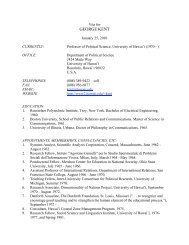
![Fall 2012 POLS 620 Syllabus [PDF] - Department of Political Science](https://img.yumpu.com/25416938/1/190x245/fall-2012-pols-620-syllabus-pdf-department-of-political-science.jpg?quality=85)
